Anyone who has spent any time in Korea is familiar with the irredentist issue of the Dokto/Takeshima/Lioncourt islands. This is one of the hundreds of issues around the world where two or more countries both claim the same hunk of rock as their own. Both sides bring out cute historical maps and literary accounts to suggest that “their” people or “their” nation claimed the territory first and like children on a playground try to project these historical references or claims into the modern present. That we are still engaged in this kind of idiocy in the 21st century is a tribute to humanity’s lack of intelligence.
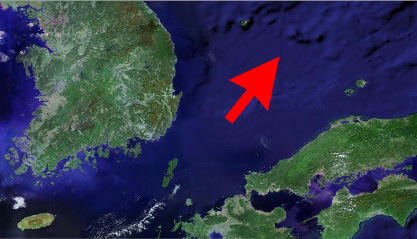
The two pieces of rock inconveniently dare to emerge from the water somewhere north of the red arrow (see the string of black shadow like blobs, probably one of those, but not enough land to show up in this Google satellite photo, please don’t try to explain exactly which one it is in the comments – I really couldn’t care less, another map here) To be honest, I’m so sick of the whole thing: I have reached Dokto saturation level and this posting will be my first and last on the topic…
Like so many other such mind-bogglingly stupid issues, people can do very silly things when they suddenly come to believe that they might potentially “lose” ownership or claim to a hunk of rock. Wonky Japanese nationalists drive around in black buses and damage their throats yelling about it while the generally apathetic Japanese public around them try to remember exactly where those islands were again. North of Hokkaido? Oh no, they were those other islands we are trying to get back from Russia. South of Kyushu somewhere? Oh no, those are those other islands that were in the news last week when we got into a fight with some Taiwanese about it.
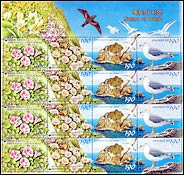
Oh ya, these were those islands that some prefectural government decided, bizarrely, to issue commemorative stamps for, even though there is practically a Korean military mini-base squeezed onto one of the rocks.
Then in Korea of course, some slightly emotional types have been known to cut off their finger or immolate themselves. School children have been commissioned to produce Dokto artwork full of expressions of love and friendship for their Japanese neighbors. I generally don’t recommend bringing up the topic in conversation. Then again, you might want to hear the Dokto song taught to children in school. To put it mildly, apathy is not widespread here when it comes to these pieces of rock.
Dokto is absolutely everywhere in daily life here. I will just share a few examples:
 Here is a picture of Craig and I wearing our Dokto T-Shirts. Ever since I have arrived, colorful Dokto T-Shirts with the phrase, “Dokto is our territory” have been on sale by a vender outside Pizza Hut here at Seoul National University subway station for the nice and cheap price of about $5. Craig is wearing a different T-Shirt, which below a drawing of the rocks says in English, “I Love Dokto” Perhaps most amusingly, I have seen this T-Shirt can be found in convenience stores in many places in the underwear section. If you are shopping yourself for a T-Shirt, I recommend mine, since it is of a thicker material and thus less resembles underwear.
Here is a picture of Craig and I wearing our Dokto T-Shirts. Ever since I have arrived, colorful Dokto T-Shirts with the phrase, “Dokto is our territory” have been on sale by a vender outside Pizza Hut here at Seoul National University subway station for the nice and cheap price of about $5. Craig is wearing a different T-Shirt, which below a drawing of the rocks says in English, “I Love Dokto” Perhaps most amusingly, I have seen this T-Shirt can be found in convenience stores in many places in the underwear section. If you are shopping yourself for a T-Shirt, I recommend mine, since it is of a thicker material and thus less resembles underwear.
 On a recent trip to Insadong we passed by a street side Dokto information table where you can get brochures and information about the island dispute and learn more about how you can help save these two rocks from Japanese aggression. I have seen several such information tables and information boards around Seoul, and they are often staffed by young and very energetic looking supporters.
On a recent trip to Insadong we passed by a street side Dokto information table where you can get brochures and information about the island dispute and learn more about how you can help save these two rocks from Japanese aggression. I have seen several such information tables and information boards around Seoul, and they are often staffed by young and very energetic looking supporters.
The other day I went to a restaurant around the corner from my dormitory and found the wall painted with charming landscapes of the Korean coastline. On one whole wall of the restaurant, sure enough, there was a painting of the two rocks, with the phrase, “Dokto is our territory” written next to it.
Then of course, there is the fact that everywhere you go, you are bombarded with signs claiming the rocks and often less than friendly things about Japan. On the walk I make to school every morning I pass by an elementary school which is decorated by these two banners, for example:
Finally, and this is my favorite. These two tiny rocks that barely make it out of the water actually get their own weather report. Yes, that is right, while watching a TV weather report recently here in Korea, I noticed that, in addition to Seoul, Busan, Cheju island, and other major regional and population centers, the audience can be relieved to learn whether it is raining, cloudy, or nothing but sunshine beaming above those sacred islands in the middle of the sea.
There is nothing unusual about these sorts of irredentist island issues becoming important political issues. Japan has its share, and China and Southeast Asia have many as well. Europe is no exception and Canadian children learn about that dreadful British betrayal when the US took a chunk of Alaska. However, simply no one, no one can hold a candle to the degree of saturation that Korean society has reached with regards to these two hunks of rock, especially amazing considering that Korea already occupy the damn things.
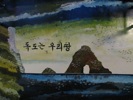
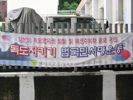
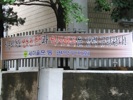
Carefully avoiding taking a side here, isn’t the issue more the mining (etc.) rights that would come with the territory, rather than the tiny, uninhabited islands themselves?
Yes Matt you are indeed right. The raw diplomatic arguments for pursuing these kinds of claims the world over usually involve resources, such as mining or fishing rights. Sometimes the amounts or access to such resources are not trivial (for example post-WWI European territorial disputes over massive coal mines etc. or the potential oil around the Spratly islands in SE Asia)
In the case of islands north of Hokkaido, Gilbraltar, or other populated areas, in addition to fishing rights etc. there is also the consideration of the juristiction over the populations that occupy them and the historical memory of the subordination of these peoples or the humiliation of the loss of territories by treaty.
This doesn’t detract at all, in my mind, from the ridiculousness of the degree to which they inflame national sentiment or the irrationality and anachronism of the arguments thrown both ways over ownership.
“Canadian children learn about that dreadful British betrayal when the US took a chunk of Alaska.”
Minor point here, but no they don’t (just to be safe, I should say at least 99% don’t).
Um, muninn, I’m sorry but did you see my e-mail, or did it somehow “vanish” or something?
Oh, by the way, I guess you know that the “Dokdo Issue” had been for quite a long time a little settled down…um no, rather “intentionally left aside”, until the Shimane Prefect heated the debate with their “Takeshima Day” bill this March.
Not to say that the Koreans or the Korean Government has acted in the most response I could imagine, but I do insist that this time the ‘new phase’ of debate was intensified by the Japanese Prefectural Government this March. Just reminded me, cause that “Gord” who posted the Childrens picture posted as if the Korean outrage just started out of nothing, which is, not, true.
Hey Al, sorry to hear I may be off on the Canadadian thing. It was a Canadian here in Korea who told me about the textbooks talking about the Canadian border with Alaska. Perhaps I shouldn’t have used it as an example since I have never seen the textbooks myself or seen it in any academic article anywhere.
Nomadism – sorry, I haven’t written any email over the weekend and didn’t want to reply until I knew what my schedule next week would look like. I’ll email soon.
As for being settled down, to be sure, it hasn’t been in the news for a while, but I had collected lots of pictures and still see it every day in my life here so I just thought I would share :-)
It never fails to amaze me to find that some “outside” observers of Korea-Japan relationship invariably perceive this type of Korean reactions as being too emotional, lack of intelligence, etc. Although I have no doubt that the poster did not mean that this type of reactions is uniquely Korean, it is remarkable that the views expressed here are glaringly ahistorical.
I believe that the original poster has balanced views on this matter (or tries to have ones). Nevertheless, I realize that without historical perspectives it can be very hard for anyboy (especially outsiders) to understand the depth of fear, alarm and anxiety Koreans experience when they sense possible aggressions, present or in the future, perpetrated by Japanese imperialism. Without doubt, the people (especially Japanese right-wingers) who try to justify past aggressions will tell you that history is irrelevant.
While I recognize that some Koreans went too far, it might be more helpful for objective observers to understand the historical context in which the “emotions” were stirred. One might find that there are reasons for being paranoid. The mix of “wonky Japanese nationalists driving around in black buses and damaging their throats yelling and the generally apathetic Japanese public” with complacency of Japanese public institutions bodes extreme ill for the peace in Asia (if we consider history relevant).
Hi Chun Ho, I’m sorry that you think my views are glaringly ahistorical – instead, I thought my views are, if anything, heavily historical.
As you suspect, I am not making any specific claim about Koreans or their emotionality, intelligence, etc. which is why I point out that these irredentist issues are common the world over. That this issue has become the most inflamed in Korea is only contingently so, and as you suggest, is much due to the experience of Japanese imperialism.
However – and here I’m being historical, Korea is not the only country to have experience colonialism, occupation, and oppression. Despite the horrors of that experience – and I assure you that I am the first to admit the severity of that experience in the Korean as well as in other cases, the historical education about and popular representations of the colonial period are severely one-dimensional and exclusivist.
I think much could be gained by coming to better understand colonialism and the experiences of imperialism and occupation the world over. I think also, along the lines of the “colonial modernity” scholars in Korea and elsewhere (NOT – I emphasize the ridiculously crude Japanese nationalist “we gave you railroads, so be happy” nonsense) that we shouldn’t simplify the story of the colonial period to one of raw Japanese aggression and valient Korean resistance. There is plenty of that to go around, but accounts of the period are horribly reductive and thus rob readers of an account of the rich diversity of experience and complex changes that happened during that period. Not doing so, in fact, basically gives Koreans a half-century “blank spot” which is filled with nothing but failure, violence and victimization – there is so much more to look at in this period. Unfortunately, that emotional ambiguity, that diversity of experience is robbed from the highly “ahistorical” and static interpretation of the period in the “Good united Korea of resistance versus Evil oppresser Japanese and their Collaborators.” There are more stories to be told. There were much subtler and often equally repressive elements of change in society which go along with the highly disciplinary nature of modernity. Unfortunately, everything gets reduced to the aggression of a foreigner.
Often times, the very ahistorical and reductivist narrative background that results colors other issues, and Dokto is one such example.
More importantly, and here is where my anti-nationalist bent comes in, quite frankly: you haven’t experienced Japanese aggression. Unless you are in your 60s or 70s or 80s, you haven’t personally been affected by it all. Instead, most young nationalists partake in the “national experience” (admittedly, your family may have suffered tragedies and if so, they will be important and this point is less relevant) and attach themselves to this organic body of the nation which moves through history and is the brunt of agression, insult, and proud expansion.
I find irridentist issues ridiculous and damaging precesily because of the additional step that nationalism takes in connecting this often flexible concept of an organic body of the nation to a physical body of territory. What the hell do these two pieces of rock – or even the resources that attach to it have to do with you?! They clearly do…but only because of these three steps: 1) Your attachment to an organic national body 3) Your attachment of that organic body to an institutional state with a monopoly on violent force. 3) Your attachment of that national body to a physical piece of territory which can be “violated” or “invaded” etc.
I will dedicate my life to exposing the serious problems entailed in 2 and 3, in particular, and attempt in all ways possible to loosen or ideally destroy the connection entailed in 2.
This is what inspires my strong wording in “That we are still engaged in this kind of idiocy in the 21st century is a tribute to humanity’s lack of intelligence.” I should, however, be more optimistic, and do in fact, hold out great hopes about the future.
To put another nail on this coffin, yesterday the Chosun Ilbo announced that the newly commissioned troop landing ship would be named, drum roll please, the Dokdo.
Heres the link http://english.chosun.com/w21data/html/news/200507/200507040024.html
Complete with comparisons to a similar Japanese landing ship.
You claim that your conclusions about the current conflict between Korea and Japan are heavily historical. My interpretation of the term “historical” is that we analyze the issue at hand from three angles: its historical origins and development, the current dynamism of parties involved, and its prognosis or possible progression in the future – all in the context of history. Under this framework, we can understand that the Korean reaction is not about just the narrow scope of territorial claim issue (or natural resources attached to it). Rather it is about the Japanese strategic intentions and ambitions that worry Korean people (and other Asian peoples). I believe the total indifference of the US toward the issue and seemingly supportive approach of the US regarding Japan’s rearmament and amendment of the Peace Constitution did not make things better.
You state: You haven’t experienced Japanese aggression. Unless you are in your 60s or 70s or 80s, you haven’t personally been affected by it all. My response: I think this is a nonstarter. What does personal experience have to do with discussions of current affairs? It seems that you imply that only those with personal experience can talk about historical collective experience. It surely is absurd. My guess is that you stated something you did not mean because you incorrectly assumed that I am a “young” and “blindly passionate” nationalist. Of course I do not believe that whether or not a party in a discussion is a nationalist makes any difference whatsoever as long as he/she is intellectually honest.
You ask: What the hell do these two pieces of rock – or even the resources that attach to it have to do with you?! My reply: Not much. But again I fear that we don’t know the long-term intentions of Japan as a nation. To my mind it is distinct possibility that the nation becomes aggressive and inflicts intolerable pains again on Asian peoples.
Frankly, I am shocked that you ask the aforementioned question because you don’t seem to appreciate the historical significance of the actions taken by Japanese institutions with complacency of other Japanese public institutions. At the same time you again insinuate that I am a nationalist and therefore my expressed views are somehow invalid (or problematic). Although I don’t think it matters, I am not a nationalist. I just have a simple belief that everybody should be given opportunities to define and realize his/her destiny. Consequently I oppose any and all types of aggression and oppression committed in the name of a group, ideology, or nation. Personally I have tried to do what I can do to help reduce/eliminate such aggression and oppression. I opposed Korean dictators. I oppose some traditional Korean cultural elements that are not consistent with modern ideas of democracy and equality. I oppose unjust treatment of immigrants here in the US (and elsewhere). I oppose injustices imposed on Palestinians by occupying Israeli forces. I also oppose any possibility of Japan becoming an imperial power again. My opposition to these aggression and oppression is not because I am a nationalist – rather because I am not a nationalist.
You also stated that: 1) Korea is not the only country to have experience colonialism, occupation, and oppression and 2) I think much could be gained by coming to better understand colonialism and the experiences of imperialism and occupation the world over. If I took the face values of the statements, I would say that you are probably right. But I am not sure what specifically you meant by learning from better understanding of worldwide colonial experiences. Do you have better examples of former colonies of imperial powers in terms of developing and maintaining modernity (whatever that is) than North and South Koreas? Don’t you think the North and South Korean achievements themselves are worthy examples of possible projectiles of achieving modernity in former colonies? Do you suppose that their strong awareness (or opposition) of imperial powers did not contribute anything to their achievements?
On a personal note: some years ago in passing my mother mentioned her experience regarding Japanese military sex slavery. One day in 1944 (when she was 12) Japanese police stationed in her village announced that they had job offers for girls from factories manufacturing military goods. They rounded up all seemingly eligible girls in the village. But they let go of my mother since she was one year too young. And she said that the villagers later found out that the girls were sent to Jina (Indochina). I felt at that moment infinitely fragile nature of human existence with my whole heart.
Hi Chun Ho, below I make a few comments in response to the points you make which I found relevant:
1) This irredentist issue isn’t unique. In addition to territorial claims, most irredentist disputes involve concern about “strategic intentions and ambitions” of the other party if it concerns a neighboring country with which there has been previous conflict. Dokto is no different. I am not in favor of rearmament (although this point is mute since Japan has rearmed) or amendment of the constitution in Japan, as you might be able guess from my previous postings, but I do not find any of Japan’s national strategic intentions or ambitions particularly concerning with regards to territory, military might, or aggression towards its neighbors. I have significant concerns about Japan’s relationship with its Asian neighbors and believe there are a number of issues we need to watch closely but the island disputes (in all cases) are only important in so far they influence domestic opinion in Japan and Korea. Largely, this is so far mainly an issue on the Korean side, and it is affecting both Korean and Japanese domestic opinion and increasing hostility between the two. I think both governments would want to make the issue dissapear, if it was politically feasible.
2) I certainly don’t want to imply that personal experience is a prerequisite to discussing the issue, and I am sure your use of the word “outsider”, while sounding condescending, is also not meant to suggest the same. My primary reason for bringing this up is to suggest that the “historical” origins of the Korean response are not usually from personal experience, but as a result of often highly distorted and reductionist national histories. Also, while I am always interested in emphasizing the context behind a current state of affairs, this is no way robs me of the responsibility to take a stand on issues I care about and in this case, I believe I have made one which is not entirely uninformed as an “outsider.”
3) I think you are motivated by a sincere concern about the potential future of an “imperial Japan” and I certainly share your sympathies. We appear to disagree simply, about the relevance and interpretation of the Dokto issue in this, and on the particular kinds of threats that a more nationalist future for Japan might entail. I, for one, think there is little or no danger of Japan becoming an aggressive empire any time in the near future, and if anything, much of the continued trends to seeing Japanese in such limited terms unecessarily and unfairly irritates the sentiments of those Japanese who deeply care about peace in the region – not to mention further assisting and radicalizing those who would claim that Asia is trying to demonize Japan.
4) Your personal story is a moving one and an important one. I am glad to hear that your mother was spared the fate of the other villagers, and hope that the issue of sex slavery and particularly the relationship between war and rape, or in this case, a massive state supported coercion of women for sexual exploitation, will receive far more attention from scholars, in the education system, and the general public. Although I have not personally confirmed this, I have read that comfort women have been removed as a direct topic of discussion from many if not all of the major textbooks published this year in Japan. If this is so, it is a truly alarming development, especially considering some of the reasonable mentions it received in some earlier progressive textbooks I found in the Children’s literature library of Tokyo. Thank you for sharing this story.
5) To return to what seems to be our major point of contention, while it isn’t entirely clear to me what you are suggesting, overall, but perhaps I might venture that your position is somewhat along these lines: “History being what it is between the two countries, there is more than enough reason to understand the strong domestic reactions to the island issue. You, an ‘outsider’ also don’t understand how deeply Koreans feel anxiety and alarm, thus I take issue with your dismissive approach.” (feel free to correct me if this is not your major point)
If so, my own position is that there is more to the anxiety and alarm being felt than simply the colonial experience itself. There is more “historical context” which is relevant, and the current rage over the issue depends on a number of contingent factors beyond the fact of Japan’s former aggression in the region. In other words, a colonial experience, even a bad one, does not automatically produce massive irrational nationalist responses to an irredentist issue. But all of this is peripheral to what my own major point: while I can certainly join you in “understanding” that the colonial expeirence and a number of other factors clearly led to the current reactions to the issue, but that does absolutely nothing to reduce the fact that irredentist disputes which develop in this way, involve mass responses, anachronistic arguments projecting conceptions of territorial control and international maritime law well into the centuries of the past, people proclaiming desperate ties to territory completely unconnected to their own lives on the basis of their national sentiments and unfounded (even if “understandable”) fears of aggression, is a sad reflection of the state of humanity. Dokto as an issue, is simply a “nonstarter” without massive nationalist sentiment and all the ugly things that go with it. However much that nationalist sentiment is based on past or perceived threats of aggression, it doesn’t somehow exempt those inflamed by this sentiment from all criticism.
ChunHo, beautifully argued.
I am also doing an essay on this islet(Dokdo or Takeshima)
I am from Korea and i am only about 15years old
When I was young, I used to think that Dokdo or Takeshima was Korean’s as their was a song about
that Islet. However, after I arrived in foreign countries, my thought began to change.
Even though
*Korean people are living in Dokdo
*Japan agreed that Dokdo is Korea’s after the defeat WW2
Japan still say that Dokdo or Takeshima is theirs.
They also made a day called ‘Takeshima Day’eventhough there was no evidence or what ever
to comment like that.
The takeshima day was made because Japanese government wanted to make the Japanese civilians to
think that Dokdo or Takeshima is theirs. I think it is also same with the fake history books from Japan
The reason they do this is because senior Japanese citizens used to work really hard as they thought or
their factory as their life and worked more than what factory/anykind of job needed.
But nawadays, Japanese teenagers got affected by the Europeans and is more caring about themsleves then factory
/ their jobs. So the government wants the Japanese citizens to feel more proud of their country so that they can
work for their country more.
Also Japanese people say that Dokdo or Takeshima is just a stupid little rock. When they think like that,
why can’t they just give it up and give it to Korea!
They have plenty of places to fish but as the ‘EAST SEA(FOR KOREANS AND CHINESE AND ALL THE COUNTRIES WHICH ARE
IN THE WEST OF THE EAST SEA)’is combination of hot and cold water their are plenty of fish, Japan has plenty of
sea. They even kill whales than why can’t they just eat whales it just like when Japan attacked Korea
as they needed land to give when their army general did somthing profitable for Japan and needed awards.
Now Japan is doing same thing for the fishermens.
Muninn, I’d hate to go against you in a debate class. (If I do, I’d need a large coffee) Thoughtful insight (seems rare in the blogging world), and worthy read. Courageous, if I may say so. In Korea and Japan (although most Japanese I run into showed indifference if not ignorance, this issue is like the gay rights or abortion debates in the States, or the Palestine-Israel conflict in the Middle East. Hot Potato. Period.
You came to Korea at a very unfortunate time, and ended up witnessing the most extreme responses about this issue. I guess you’d be suprised to see that less then a month or so after those moments, the T-shirts and slogans you mentioned all disappeared from the streets, and of course the topic vanished from public discourse – though I concede it is merely subdued and could be inflamed anytime.
As for being saturated, I can sympathize with your sentiments, but then the natural question to ask is why aren’t all those Koreans saturated even though they’ve been hearing this on and on and on. (For instance, anti-communist propaganda, abused by former regimes to instill real fear in Koreans, saturated Koreans, and now has become a line of joke in movies.) And to that question, as you would, the heart of the Dokto issue to Koreans is the history and the unresolved history that it evokes. And this is not just a matter of distorted versions of history being taught, but more about being confronted with a Japan that actually incarnates the fears that in other instances Koreans wouldnt believe.
For Koreans, it’s not a matter of securing a few rocks, for potential economic gains, nor even a matter of asserting national grandeur or sovereignty by claiming those islands – as it may be for Japanese, or other nationalities in their parallel territorial disputes. It’s the horror that history has not been settled, that even half a century after liberation the Japanese can still claim possession over a part of Korea, and in turn, the realization that the Japanese never have ever relinquished their rights over the Korean peninsula is what troubles Koreans. The general Japanese apathy to it does not embarrasss the hot-headedness of Koreans in comparison, as one might believe it should, but rather appalls the Koreans to see again that the Japanese are utterly ignorant of what they’ve inflicted on their immediate neighbors and what there mere “normal”普通 economic and nationalistic policies or statements imply for Koreans. When one realizes that ones neighbor does show the characteristics that one though was only a caricature in by-gone textbooks, and thus becomes a living threat, that’s when one transcedes the saturation point.
Some bloggers bite more than they can chew and then become argument masters to save their face in public…was my first impression. Although I respect you Munnin for being nice and respectful enough in your arguments. You are not like some ignorant know-it-all-about-Korea loser expats here and there.
And condescending attitudes toward us emotional Koreans don’t bother me anymore because some of us Koreans have now learned to be condescending toward some foreign peoples in recent years due to our economic and cultural success. It feels kind of good when I am condescending, although it secretly ashames me. Because it means we are basically as shallow and mean-spirited as some of our neighbors. -_-)
About Dokdo..
Horror is the word. (And “Irredentist” is grossly superficial and ahistorical..)
Let’s be a simpleton for a moment and substitue Koreans for Jews and Japanese for Nazis and you will get the more real historical picture than you suggested. Emotion ultimately comes from human survival instinct, you know.
Sorry for my simple English. I’m not as simple as my Enlgish, but it’s not my mother tongue so give me and my logic a grain of salt please. -_-